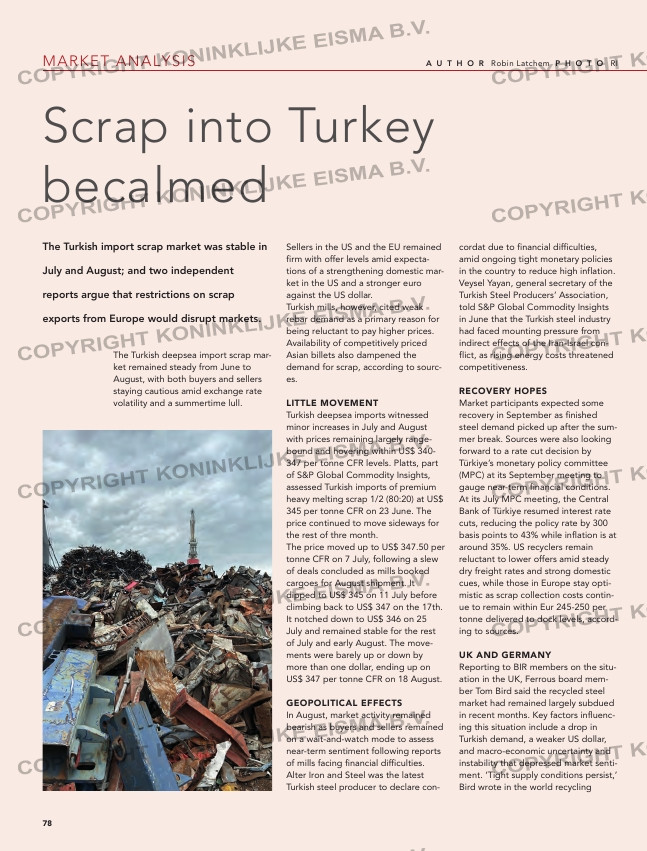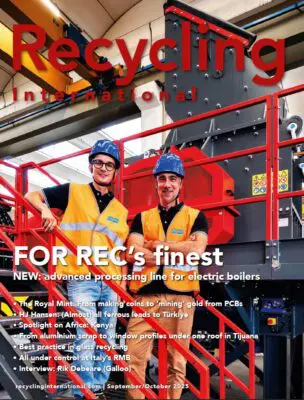Page 86 from: Recycling International September/October 2025

MARKET ANALYSIS
Scrap into Turkey
becalmed
The Turkish import scrap market was stable in
July and August; and two independent
reports argue that restrictions on scrap
exports from Europe would disrupt markets.
78
organisation’s Mirror. ‘Many shredders
are operating at only around 60%
capacity, reflecting limited material
flows and cautious operations.
Exchange rate volatility and macro-
economic conditions will continue to
shape sentiment and pricing direc-
tion.’
Fellow member Denis Reuter added:
‘Weak construction and automotive
orders as well as high energy costs are
weighing on the [German] industry.
The energy-intensive blast furnace
route recorded a drop of more than
13%. And, although electric steel pro-
duction increased slightly, it remains at
a low level. Pressure is being applied
by the combination of global overca-
pacity and competitive imports from
Asia.’
CHINA PROFITABILITY
Also in the Mirror, Michael Gaylard
noted that more than 60% of Chinese
steel mills were profitable in May, a
stark contrast to the widespread losses
during the 2015-16 overcapacity crisis.
Meanwhile, crude steel output
declined 1.7% year-on-year to 431.6
million tonnes over the January-May
period. Gaylard reported the Chinese
authorities were said to be considering
further policy actions, including possi-
ble output cuts.
India’s steel sector, meanwhile, is
showing resilience despite seasonal
and macro-economic headwinds.
Crude steel output has continued to
rise, with production up 9.7% year-on-
year in May and year-to-date volumes
8.2% higher than in the opening five
months of 2024.
Separately, FastMarkets reported that
demand in India for ferrous scrap
imports had been undercut by falling
prices for domestic direct-reduced
iron (DRI). ‘As a result, even though
global and Indian steel scrap prices
have declined, producing finished
steel with a higher proportion of DRI
remains economically viable, accord-
ing to sources.’ The analysts added
that those who believed imports of
scrap would not be unduly affected
said it was because imported scrap
would still be required for steel mills
producing higher grades of steel.
A U T H O R Robin Latchem P H O T O RI
The Turkish deepsea import scrap mar-
ket remained steady from June to
August, with both buyers and sellers
staying cautious amid exchange rate
volatility and a summertime lull.
Sellers in the US and the EU remained
firm with offer levels amid expecta-
tions of a strengthening domestic mar-
ket in the US and a stronger euro
against the US dollar.
Turkish mills, however, cited weak
rebar demand as a primary reason for
being reluctant to pay higher prices.
Availability of competitively priced
Asian billets also dampened the
demand for scrap, according to sourc-
es.
LITTLE MOVEMENT
Turkish deepsea imports witnessed
minor increases in July and August
with prices remaining largely range-
bound and hovering within US$ 340-
347 per tonne CFR levels. Platts, part
of S&P Global Commodity Insights,
assessed Turkish imports of premium
heavy melting scrap 1/2 (80:20) at US$
345 per tonne CFR on 23 June. The
price continued to move sideways for
the rest of thre month.
The price moved up to US$ 347.50 per
tonne CFR on 7 July, following a slew
of deals concluded as mills booked
cargoes for August shipment. It
dipped to US$ 345 on 11 July before
climbing back to US$ 347 on the 17th.
It notched down to US$ 346 on 25
July and remained stable for the rest
of July and early August. The move-
ments were barely up or down by
more than one dollar, ending up on
US$ 347 per tonne CFR on 18 August.
GEOPOLITICAL EFFECTS
In August, market activity remained
bearish as buyers and sellers remained
on a wait-and-watch mode to assess
near-term sentiment following reports
of mills facing financial difficulties.
Alter Iron and Steel was the latest
Turkish steel producer to declare con-
cordat due to financial difficulties,
amid ongoing tight monetary policies
in the country to reduce high inflation.
Veysel Yayan, general secretary of the
Turkish Steel Producers’ Association,
told S&P Global Commodity Insights
in June that the Turkish steel industry
had faced mounting pressure from
indirect effects of the Iran-Israel con-
flict, as rising energy costs threatened
competitiveness.
RECOVERY HOPES
Market participants expected some
recovery in September as finished
steel demand picked up after the sum-
mer break. Sources were also looking
forward to a rate cut decision by
Türkiye’s monetary policy committee
(MPC) at its September meeting to
gauge near-term financial conditions.
At its July MPC meeting, the Central
Bank of Türkiye resumed interest rate
cuts, reducing the policy rate by 300
basis points to 43% while inflation is at
around 35%. US recyclers remain
reluctant to lower offers amid steady
dry freight rates and strong domestic
cues, while those in Europe stay opti-
mistic as scrap collection costs contin-
ue to remain within Eur 245-250 per
tonne delivered to dock levels, accord-
ing to sources.
UK AND GERMANY
Reporting to BIR members on the situ-
ation in the UK, Ferrous board mem-
ber Tom Bird said the recycled steel
market had remained largely subdued
in recent months. Key factors influenc-
ing this situation include a drop in
Turkish demand, a weaker US dollar,
and macro-economic uncertainty and
instability that depressed market senti-
ment. ‘Tight supply conditions persist,’
Bird wrote in the world recycling
78-79-80_maferrous.indd 78 09-09-2025 13:59



